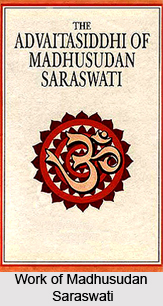 Madhusudhana Sarasvati was a disciple of Visvesvara Sarasvati. Madhusudana Sarasvati is the most celebrated name in the records of the dvaita-advaita debate. His Advaitasiddhi is a classic work. Madhusudana was born in West Bengal. His original name was Kamalanayana. He was educated in the Navya Nyaya tradition. However he had become an Advaita sannyasin and thereafter moved to Varanasi to study Advaita.
Madhusudhana Sarasvati was a disciple of Visvesvara Sarasvati. Madhusudana Sarasvati is the most celebrated name in the records of the dvaita-advaita debate. His Advaitasiddhi is a classic work. Madhusudana was born in West Bengal. His original name was Kamalanayana. He was educated in the Navya Nyaya tradition. However he had become an Advaita sannyasin and thereafter moved to Varanasi to study Advaita.
As per legend Madhusudana Sarasvati is said to have gone to Navadvipa to meet Chaitanya. It is believed that he is said to have studied works of Udayana like the tattva-chintamani of Gangesha and its commentaries. Thereafter Madhusudana was recognized as a leading scholar in Nyaya. He was influenced by the Bhakti wave that swept across Bengal due to Chaitanya Mahaprabhu.
The other story mentions that Madhusudana had at that time accepted the bheda-vada, the doctrine of difference. The logical basis was the realism of Nyaya seemed to provide a logical basis to bheda. He became keen on "disproving" advaita using all his skills in logic. He studied Vedanta under Rama-tirtha. Madhusudana was highly skilled in dealing with logic and dialectics.
Works of Madhusudana Sarasvati
Madhusudana composed several compositions. It involved the defence and exposition of Advaita Vedanta. The well known among these is Advaitasiddhi, which opposes the Dvaita Vedanta arguments in Vyasatirtha`s work Nyayamrta. He also composed nine other works among which five were commentaries on the Bhagavad Gita and Bhagavata Purana. He also composed the Isvarapratipatti prakasa, vedantakalpalatika, sarasangraha on sarvajnAtman`s samkshepa Sariraka, and siddhantabindu.
Around twenty-one books have been ascribed to Madhusudana. Among these twelve of his books are based on philosophy, others are poems, plays and miscellaneous themes.
His works are:
* Advaita-siddhi
* Advaita-manjari
* Advaita-ratna-raksana
* Atma-bodha-tika
* Ananda-madakini
* Prasthanabheda
* Bhagavad-gita-gudhartha-dipika
* Vedanta-kalpa-latika
* Sastra-siddhanta-lesa-tika
* Samksepa-sariraka-sara-samgraha
* Siddhanta-tatva-bindu
* Pramahamsa-priya
* Veda-stuti-tika
* Asta-vikriti-vivarana
* Rajanam-prtibodha
* Isvara-pratipatti-prakasa
* Bhagavata-bhakti-rasayana
* Bhagavata-purana-prathamasloka-vakhya
* Krishna-kutuhala-nataka
* Bhakti-samanya-nirupana
* Sandilya-sutra-tika
* Hari-lila-vakhya
Madhusudana sarasvati was an ardent devotee of Lord Krishna. He bridged the satvata school of Pancharatra Vaishnavism and Advaita Vedanta philosophy. Madhusudana differs from Adi Sankara in some interpretations of the Brahma Sutras and the Gita.



















